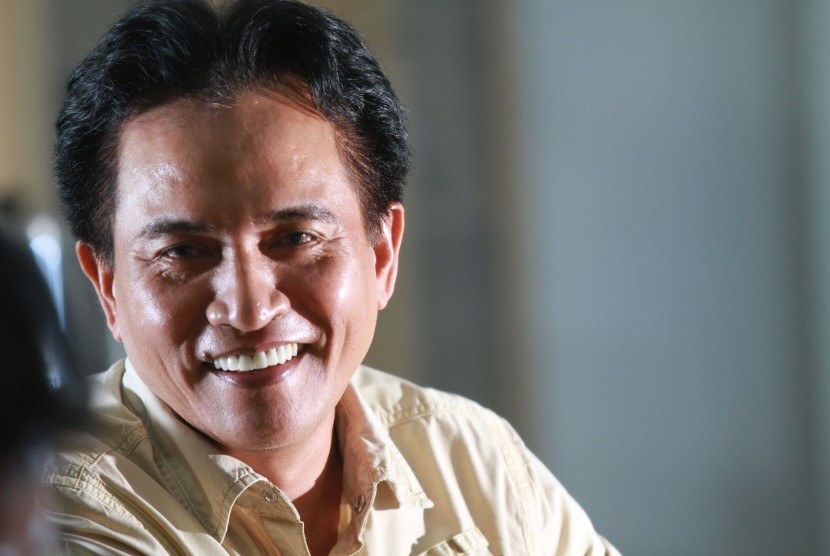REPUBLIKA.CO.ID, JAKARTA -- The Constitutional Court maintained the presidential threshold regulation here on Thursday, following its decision to turn down Yusril Ihza Mahendra's request.
"The court denies the request of the applicant," chief justice Hamdan Zoelva said, reading the verdict following Yusril's request for a judicial review of Law Number 42 of 2008 and for a simultaneous election and ending of the presidential threshold.
In its consideration, the court states that the request for simultaneous legislative and presidential elections had been decided in the court's decision number 14/PUU-XI/2013 read on January 23, 2014.
"Although the court does not explicitly mention the a quo article (demanded by Yusril), it is 'mutatis mutandis' (automatically effective) for the applicant's argument," justice Harjono said, reading the court's ruling.
The court denied that the ruling on simultaneous elections in 2019 and afterwards was issued solely based upon consideration of the technical readiness of the General Elections Commission (KPU) for their implementation this year, as Yusril argued.
With regard to Yusril's lawsuit linked to the presidential threshold regulated under Article 9 of the law on presidential elections, the court replied that the provision is an open legal policy or an open delegation of authority, which could be determined as a legal policy by law makers.
Article 9 of the law on presidential elections states that "the pair of presidential and vice presidential candidates is proposed by a political party or a group of political parties participating in the legislative elections that are able to meet the requirement of minimally securing 20 percent of parliamentary seats or 25 percent of total legitimate national votes.
"Based on the consideration, the applicant's argument for others and more is not legally reasonable," Harjono said.
Yusril's request for interpretation of Article 4 paragraph (1) and Article 7C in connection with Article 22E paragraph (1), paragraph (2) and paragraph (3), as well as Article 6A paragraph (2) of the 1945 Constitution is not acceptable, he said.
Upon hearing the verdict, Yusril, who is a law professor and a former ministry of justice official, but also a political party figure, expressed his disappointment.
He said the Constitutional Court has claimed to be the sole interpreter of the constitution, but in this case the court said it has no authority to interpret it.
He noted that the court's refusal to interpret article 6A paragraph 2 of the 1945 Constitution may lead to a constitutional legitimacy issue.
"If the elected president later has a problem, let the court decide by itself. As an academician, I have already carried out my moral obligation to warn that a problem may arise, and so I am no longer responsible," he said.
Yusril has requested a review of Article 3 Paragraph (4) of the law on presidential elections that regulates that "the date, day and time of voting for the presidential and vice presidential election is determined by the KPU."
He has also requested a review of Article 9, Article 14 paragraph (2) and Article 112.
Article 14 paragraph (2) states that the "registration period referred to by Article 13 is maximally seven days, since the confirmation of the results of the legislative elections."
Article 112, meanwhile. States that "the presidential and vice presidential election is implemented three months, at the latest, after the announcement of the results of the general elections for members of DPR (the House of Representatives) DPD (Regional Representative Council), provincial, and district/city legislative assemblies.
Yusril, who has been named a presidential candidate by his Moon and Star Party for the 2014 election, felt his constitutional rights have been denied due to the articles.
According to Yusril, Article 9 of the law on presidential elections runs contrary to Article 6A paragraph (2) and Article 22E paragraph 30 of the 1945 Constitution due to manipulation of the word "general election."
He said the 1945 Constitution does not specifically regulate stages of the general election.
Article 22E paragraph (1) and Article 2 of the 1945 Constitution state that the general election it refers to is conducted once (simultaneously), so that Article 3 paragraph (4), Article 9, Article 14 paragraph (2) and Article 112 run against the norms in Article 4 paragraph (1) and Article 7C of the 1945 Constitution.
Yusril said provisions regulated in Article 3 paragraph (4), Article 9, Article 14 paragraph (2) and Article 113 of the 1945 Constitution are not meant for implementing or enforcing the norms of the Constitution, but even hinders the emergence of presidential and vice presidential candidates from other parties.
On the question of whether the number of candidates could become too large unless limited by a threshold, Yusril said that it is not relevant because only 12 parties would participate in national elections and three others in regional elections, though only in Aceh.
He said the participation of 12 pairs in the presidential election was still reasonable.



